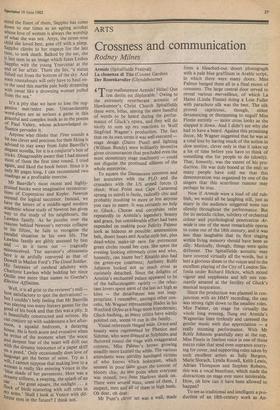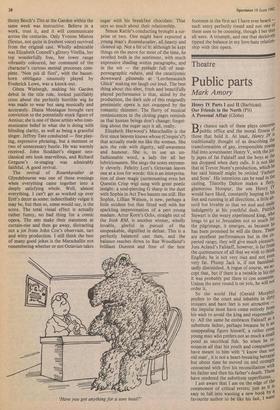ARTS
Crossness and communication
Rodney Milnes
Armide (Spitalfields Festival) Trop malheureuse Armide! Helas! Que J. ton destin est deplorable.' Owing to the extremely reverberant acoustic of Hawksmoor's Christ Church Spitalfields these were, helas, among the mere handful of words to be heard during the perfor- mance of Gluck's opera, and they will do nicely to sum up my reactions to Wolf Siegfried Wagner's production. The fact that on its own terms it was well executed stage design (Dacre Punt) and lighting (William Bundy) were brilliantly inventive given circumstances that precluded even the most elementary stage machinery — could not disguise, the profound silliness of the whole enterprise.
To equate the Damascene sorceress and her associates with the PLO and the crusaders with the US armed forces (I think: West Point and Cape Canaveral sprang to mind) is facile, radically chic and probably insulting to more or less anyone you care to name. It was certainly no help to Gluck. Chorus and coryphees refer repeatedly to Armida's legendary beauty and grace, but considerable effort had been expended on making poor Felicity Palmer look as hideous as possible: ammunition belt, desert boots and Arafat-style hat, plus dead-white make-up save for putrescent green circles round her eyes. She spent the evening looking extremely cross and who, honestly, can blame her? Rinaldo also had the green-eye treatment; Anthony Rolfe Johnson looked not so much cross as curiously detached. Since the delights of Armida's enchanted palace appeared to be of the hallucinogenic variety — the reluc- tant lovers spent most of the last act high as kites the detachment was not inap- propriate. I remember, amongst other con- ceits, Mr Wagner representing Hades in his Wexford Orfeo as a huge neon hypodermic; Gluck-bashing, as many critics have wittily pointed out, seems to run in the family.
Visual references ranged wide. Grace and beauty were represented by Phenice and Sidonie, who were dressed as Sylphides and fluttered round the stage with exaggerated coyness, Miss Palmer's brows growing steadily more knitted the while. The various attendants were untidily bandaged victims of who knows which holocaust, which seemed in poor taste given the context of bloody chic. At one point when everyone was stoned, two Jean Harlows slunk on. There were several nuns, some of them, I suspect, men and all of them in high heels. Oh dear, oh dear. Mr Punt's clever set was a wall, made
from a bleached-out desert photograph with a pale blue graffitum in Arabic script, in which there were many doors. Miss Palmer banged them all in a final excess of crossness. The large central door served to reveal various merveilleux, of which La Haine (Linda Finnic) doing a Loie Fuller with parachute silk was the best. The silk proved capricious, though, either detumescing or threatening to engulf Miss Finnie entirely — more cross looks as she slapped it down. And I didn't see why she had to have a beard. Against this promising decor, Mr Wagner suggested that he was at a total loss by having much of the action in slow motion, clever only in that it takes up a lot of time before you have to think of something else for people to do (slowly). That, honestly, was the extent of his pro- duction. He was duly booed at the end; so many people have told me that this demonstration was organised by one of the singers that this scurrilous rumour may perhaps be true.
Now if Armide were a load of old rub- bish, we would all be laughing still, just as many in the audience sniggered none too silently throughout the performance. But for its melodic riches, subtlety of orchestral colour and psychological penetration Ar- mide is one of the most remarkable operas to come out of the 18th century, and it was less than laughable that its first staging within living memory should have been so silly. Musically, though, things were quite different. The Spitalfields acoustic may have covered virtually all the words, but it lent a glorious sheen to the voices and to the excellent playing of the City of London Sin- fonia under Richard Hickox, which mixed vigour and suppleness and left one con- stantly amazed at the fertility of Gluck's musical inspiration.
Since the production was planned in con- junction with an HMV recording, the cast was strong right down to the smallest roles. Miss Palmer, on stage for virtually the whole long evening, flung out Armida's Wagnerian lines tirelessly and caressed the gentler music with due appreciation — a really stunning performance. With Mr Rolfe Johnson gratefully easy at the top, Miss Finnie in fearless voice in one of those mezzo roles that send even sopranos scurry- ing for cover, and supporting roles taken by such excellent artists as Sally Burgess, Marie Slorach, Lynda Russell, Keith Lewis, Adrian Thompson and Stephen Roberts, this was a vocal beanfeast, which made the distractions on stage ever more intolerable. How, oh how can it have been allowed to happen?
To see as traditional and intelligent a pro- duction of an 18th-century work as An-
thony Besch's Tito at the Garden within the same week was instructive. Believe in a work, trust it, and it will communicate across the centuries. Only Yvonne Minton (Sextus, not quite in freshest voice) survived from the original cast. Wholly admirable was Elizabeth Connell's glittery Vitellia, her top wonderfully free, her lower range vibrantly coloured, her command of the character's curious mental processes com- plete. 'Non piu di fiori', with the basset- horn obbligato sinuously played by Frederick Lowe, was a knock-out.
GOsta Winbergh, making his Garden debut in the title role, looked justifiably cross about the perfectly horrible wig he was made to wear but sang musically and accurately. Diana Montague brought rare conviction to the potentially stock figure of Annius; she is one of those artists who com- municates belief in what she is doing with blinding clarity, as well as being a graceful singer. Jeffrey Tate conducted — fine play- ing, expressive phrasing, but a moment or two of unnecessary bustle. He was warmly received. John Stoddart's elegant neo- classical sets look marvellous, and Richard Gregson's re-staging was admirably faithful. A good revival.
The revival of Rosenkavalier at Glyndebourne was one of those evenings when everything came together into a deeply satisfying whole. Well, almost everything. I can't get as worked up over Erte's decor as some: indescribably vulgar it may be, but then so, some would say, is the score. The total visual effect is actually rather funny, no bad thing for a comic opera. The sets make their statement at curtain-rise and then go away, distracting not a jot from John Cox's observant, tart and witty production. I still think the best of many good jokes is the Marschallin not remembering whether or not Octavian takes
sugar with his breakfast chocolate. That says so much about their relationship.
Simon Rattle's conducting brought a sur- prise or two. One might have expected a young man's Rosenkavalier, all hearty and cleaned up. Not a bit of it: although he kept things on the move for most of the time, he revelled both in the sentiment, with much expressive shading within paragraphs, and in the wit — the prelude full of near- pornographic rubato, and the cataclysmic downward glissando at 'Lerchenauisch Gliick' making me laugh out loud. The best thing about this alert, fresh and beautifully played performance is that, aided by the production, the dark side of this resignedly pessimistic opera is not swamped by the romantic shimmer. The flurry of musical reminiscences in the closing pages reminds us that human beings don't change: forget- ting about the sugar says it all, really.
Elizabeth Harwood's Marschallin is the first since heaven knows whose (Crespin's?) that actually made me like the woman. She acts the role with dignity, self-awareness and humour. She is, to use an un- fashionable word, a lady for all her lubriciousness. She sings the notes extreme- ly cleverly. Felicity Lott's Octavian leaves one at a loss for words: this is an interpreta- tion of sheer magic (surmounting even her Quentin Crisp wig) sung with great poetic insight: a soul-piercing G sharp in the duet with Sophie in Act Two haunts me still. Her Sophie, Lillian Watson, is new, perhaps a little strident but that fitted well with her sparkling impersonation of a pert young madam. Artur Korn's Ochs, straight out of the Irish RM, is another winner, wholly lovable, gleeful in pursuit of the unspeakable, dignified in defeat. This is a perfectly balanced cast then, and the balance reaches down to Rae Woodland's brilliant Duenna and four of the best 'Have you got anything for a sore head?' footmen in the first act I have ever heard — each entry perfectly timed and not one of them seen to be counting, though I bet they all were. A triumph, and one that decisively tipped the balance in my love-hate relation- ship with this opera.





































 Previous page
Previous page